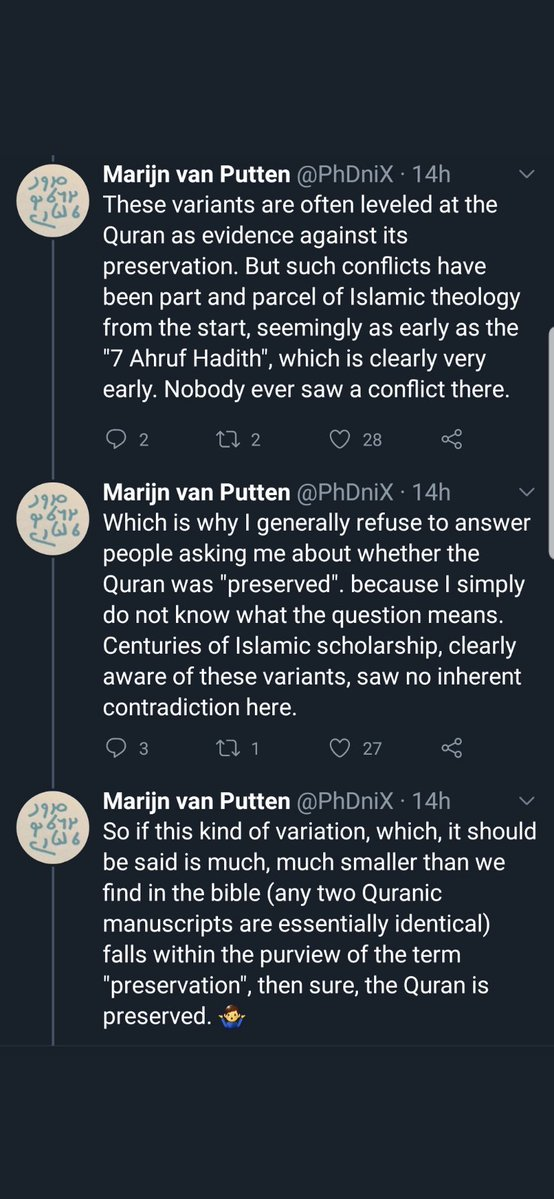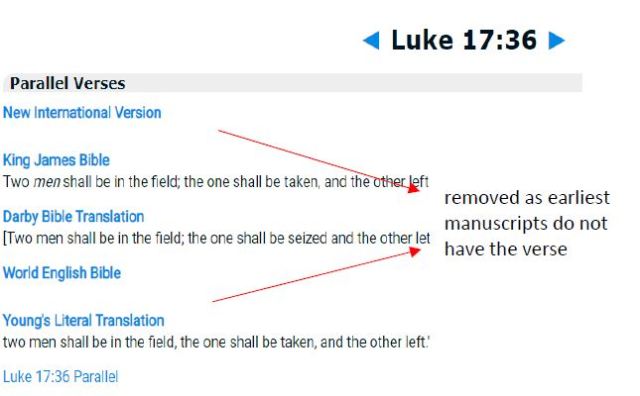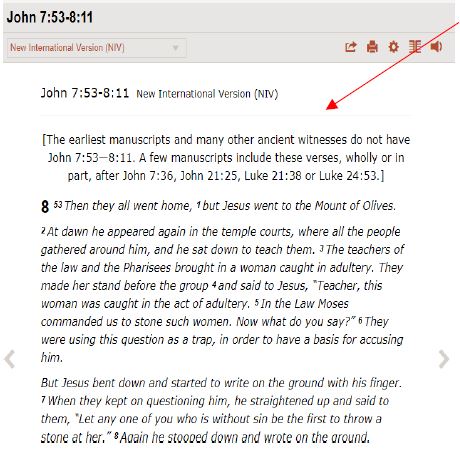بِسْمِ اللهِ الرَّحْمٰنِ الرَّحِيْم
Refuting the “26 Qur’ans” Lie
By Quran and Bible Blog Contributor abusafiyah1
Christian speakers such as Jay Smith, “Rob Christian” and many other known anti-Islam preachers trick their fans into believing that there are 26 or even up to 32 versions of the Qur’aan. What they fail to inform their supporters is that none of these are different “versions”! They hilariously quote differences in words from Hafs and Warsh to “prove” to their followers that the Qur’aan has been changed.
Qira’at and Ahruf
The Hans Wehr Dictionary Of Modern Written Arabic defines Qirâ’a as:
“Qirâ’a pl. -ât recitation, recital (especially of the Koran); reading (also, e.g., of measuring instruments); manner of recitation, punctuation, and vocalization of the Koranic text.”[1]
Shaykh Saalih Al-Munajjid said (emphasis ours):
“The best of the scholarly opinions concerning what is meant is that there are seven ways of reciting the Qur’aan, where the wording may differ but the meaning is the same; if there is a different meaning then it is by way of variations on a theme, not opposing and contradiction.”[2]
In addition, Bilal Philips states that (emphasis ours):
“[a] Qirâ’ât is for the most part a method of pronunciation used in the recitations of the Qur’an. These methods are different from the seven forms or modes (ahruf) in which the Qur’an was revealed. The seven modes were reduced to one, that of the Quraysh, during the era of Caliph ‘Uthman, and all of the methods of recitation are based on this mode. The various methods have all been traced back to the Prophet (peace be upon him) through a number of Sahaabah who were most noted for their Qur’anic recitations. That is, these Sahaabah recited the Qur’an to the Prophet (peace be upon him) or in his presence and received his approval. Among them were the following: Ubayy Ibn K’ab, ‘Alee Ibn Abi Taalib, Zayd Ibn Thaabit, ‘Abdullah Ibn Mas’ud, Abu ad-Dardaa and Abu Musaa al-Ash’aree. Many of the other Sahaabah learned from these masters. For example, Ibn ‘Abbaas, the master commentator of the Qur’an among the Sahaabah, learned from both Ubayy and Zayd.”[3]
The transmission of the Qur’an is mutawâtir, meaning, there are many narrators on each level of the chain. Thus, a mutawâtir hadith is one which is reported by such a large number of people that they cannot be expected to agree upon a lie, all of them together.[4]
Shaykh Saalih Al-Munajjid also states that:
“[w]ith regard to the seven recitations or ten recitations, they are present in what was compiled by ‘Uthmaan and have to do with adding a letter or omitting a letter, or elongating or shortening a vowel. All of that is included in the one style that ‘Uthmaan (may Allaah be pleased with him) compiled. The intention behind that was to preserve the word of Allaah and protect people from differences that could harm them or cause fitnah among them.”[5]
As for the “differences” between Hafs and Warsh, examples include the following:
- In Surah 2:86, the word يَعْمَلُونَ is used in the Warsh text while تَعْمَلُونَ is used in the Hafs text.
- In Surah 4:14, the word نُدْخِلْهُ is used in the Warsh text while يُدْخِلْهُ is used in the Hafs text.
- In Surah 3:157, the word تَجْمَعُونَ is used in the Warsh text while يَجْمَعُونَ is used in the Hafs text.
- In Surah 3:83, the word تُرْجَعُونَ is used in the Warsh text while the word يُرْجَعُونَ is used in the Hafs text.
- In Surah 3:146, the word قَاتَلَ is used in the Warsh text while the word قتِلَ are used in the Hafs text.
None of these recitations change the intended meaning of the verse.
The Evidences from the Authentic Sunnah
With regards to the 7 or 10 Qira’at, the following ahadith explain their significance:
“Narrated by Abdullah: That he heard a man reciting a Qur’anic Verse which he had heard the Prophet reciting in a different way. So he took that man to the Prophet (and told him the story). The Prophet said, ‘Both of you are reciting in a correct way, so carry on reciting.’ The Prophet further added, ‘The nations which were before you were destroyed (by Allah) because they differed.’”[6]“Narrated ‘Abdullah bin ‘Abbas: Allah’s Apostle said, ‘Gabriel recited the Qur’an to me in one way. Then I requested him (to read it in another way), and continued asking him to recite it in other ways, and he recited it in several ways till he ultimately recited it in seven different ways.’”[7]
In Imam Malik’s Muwatta:
“Yahya related to me from Malik from Ibn Shihab from Urwa ibn az-Zubayr that Abd ar-Rahman ibn Abd al-Qari said that he had heard Umar ibn al-Khattab say, “I heard Hisham ibn Hakim ibn Hizam reciting Surat al-Furqan (Sura 25) differently from me, and it was the Messenger of Allah, may Allah bless him and grant him peace, who had recited it to me. I was about to rush up to him but I granted him a respite until he had finished his prayer. Then I grabbed him by his cloak and took him to the Messenger of Allah, may Allah bless him and grant him peace, and said, ‘Messenger of Allah, I heard this man reciting Surat al-Furqan differently from the way you recited it to me.’ The Messenger of Allah, may Allah bless him and grant him peace, said, ‘Let him go.’ Then he said, ‘Recite, Hisham,’ and Hisham recited as I had heard him recite. The Messenger of Allah, may Allah bless him and grant him peace, said, ‘It was sent down like that.’ Then he said to me, ‘Recite’ and I recited the sura, and he said, ‘It was sent down like that. This Qur’ an was sent down in seven (different) ways, so recite from it whatever is easy for you.‘”[8]
In addition to this, there are the mutawâtir reports that reach the Companions of the Prophet.
Proofs from Unbiased Academics
Academics, such as Marin van Putten, state that the variants do not prove that the Quran has not been preserved (see below for a screenshot of his Twitter account), so even western academics refute the Christian missionaries. We can thus summarize that:
- No actual scholar considers the Qira’at to be against the claim that the Qur’aan has been preserved.
- Unlike what the Christian missionaries tell us, the Qur’anic manuscripts are identical.
- Islamic scholars have known about the Qira’at for centuries. Yet, nobody used them to prove that the Qur’aan has been changed.
- None of the Qira’at are different versions of the Qur’aan. Those using Yasir Qadhi’s words to show that Islamic scholars agree that the Qur’aan is changed are wrong as he himself clarified the error saying that missionaries have twisted his words to suit their agenda. He then stated scholars agree it is a proven fact that the Qur’aan has been preserved in its entirety and that all the Qira’at are revealed from Allaah.

Reason for the Deception of Christian Missionaries
To all the Christians using the “26 or 32 versions” lie, do any of these “versions” have the following kinds of occurrences? Of course not!


Christian speakers such as Jay Smith made up the “26 Qur’ans” lie since Muslims truthfully criticize the Bible as being corrupted. It is sad that he has to use our own Islamic sources to state that the Qur’an has been “corrupted”, even though they say nothing of the sort! It is extremely deceptive of Christians such as SOCO Films to show random and unsuspecting Muslims, who are completely unaware of the legitimacy of the qira’at, the alleged “differences” between them!
Based on the evidence, the claim that there are 26 or even 32 different Qur’ans is an easily refutable lie. And Allaah (God) knows best.
[1] Hans Weir, A Dictionary of Modern Written Arabic, 4th Edition, ed. J. Milton Cowan (Urbana, Illinois: Spoken Language Services, Inc., 1993), p. 882.
[2] https://islamqa.info/en/answers/5142/the-revelation-of-the-quraan-in-seven-styles-ahruf-sing-harf
[6] Sahih Al-Bukhari, 66:87, https://sunnah.com/bukhari/66/87.
[7] Sahih Al-Bukhari, 66:13, https://sunnah.com/bukhari/66/13.

